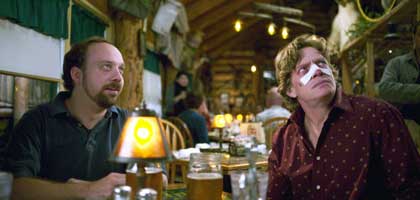
Red, White And Brew


Middle-aged nerd and jock go on the road to sip wine? If this seems an old-hat concept, think again, for Alexander Payne's Sideways is a full-bodied and winningly downbeat comedy. By Mark Salisbury.
Alexander Payne's latest film Sideways begins and ends with insistent hands knocking on front doors, the twin images book-ending a bittersweet narrative distinguished by a compassion that's conspicuously lacking in other recent US studio releases. In this richly comic tale, two male fortysomething friends - high-school English teacher and would-be novelist Miles (Paul Giamatti) and washed-up soap star Jack (Thomas Haden Church) - face up to the surprises and disappointments of a week-long road trip to the wine country of California's Santa Ynez Valley in the run-up to Jack's wedding the following weekend. Yet despite the contrived set-up, Miles and Jack aren't stock comic characters but rather amiable individuals beset by human flaws and foibles and unfulfilled desires, grown-ups adrift in a world they don't fully understand.
Since his provocative debut feature Citizen Ruth (1996), in which Laura Dern's pregnant solvent-abuser finds herself at the centre of an abortion-rights battle, Payne has probed the manners and mores of Middle America with a satirical wit and acute eye for social distinctions. In particular he has focused on long-suffering ordinary men awash with unfulfilled ambition and mounting regret, be they Matthew Broderick's bewildered teacher meeting his match in Reese Witherspoon's ruthlessly ambitious student in the high school of Election (1999) or Jack Nicholson's retired, suddenly widowed insurance salesman embarking on a road trip en route to his daughter's wedding in About Schmidt (2002). "I thought About Schmidt was very funny, but many people found it quite dreary. So I wanted Sideways to be a really good time," says Payne.
And indeed with Sideways Payne and his long-time writing partner Jim Taylor have brought a lighter, more soulful touch to a film that mixes the well-worn cinematic conventions of the road movie and the buddy film. Adapted from a novel by Rex Pickett, it's the first film Payne has made outside his hometown of Omaha, Nebraska, and the change has done him good. In many ways Miles is a typical Payne protagonist, a basically good person riddled with unease and inner disenchantment. But he and Jack couldn't be an odder couple. Miles is a perpetual worrier, Jack a sex-on-the-brain charmer still trading on his looks and residual fame. While Miles is an oenophile, his friend, though willing to learn, will taste wine while chewing gum. What keeps this friendship of former college roommates going seems a mystery, though as the film progresses we better understand the psychological underpinnings of the relationship. They're like two sides of a whole: Jack the sensualist and extrovert, too busy being relaxed to look inside; Miles the introvert neurotic, too caught up in his own intellect to enjoy himself. It's a buddy-movie dynamic familiar from Michael Cacoyannis' Zorba The Greek (1964) or Dino Risi's Il sorpasso/The Easy Life (1962), both of which derive their humour from the contrast between the shy introvert paralysed in the presence of the woman he longs for and his apparently more sexually sophisticated friend. But if Miles and Jack sound like two retreads from dozens of other buddy movies, the difference is that their warts-and-all sang froid about their own loser status encourages a forgiving approach from the audience.
Sideways opens with Miles being roused from sleep by workers outside his San Diego home who need him to move his car. It's Saturday and he's late in picking up Jack in Los Angeles, caught up in last-minute wedding preparations in the midst of his overbearingsoon-to-be in-laws. The trip is Miles' treat in lieu of a stag night. For him it's envisaged as a week of superb tastings, good food and quality time on the golf course, but Jack soon makes it clear that what he wants is to have as much sex as possible and to get Miles laid too. That's his gift to a friend still in the grip of depression two years after his divorce.
Payne first read Pickett's novel in 1999 on the plane to America after Election screened at the Edinburgh film festival and he was already committed to About Schmidt. For that film Payne and Taylor tossed out most of the source material from Louis Begley's novel, but here they've remained faithful to a largely autobiographical tale that in fact started life as a screenplay. Less mordant than Citizen Ruth, less pointed than Election, less concerned with ridicule than About Schmidt, it's a more reflective work than Payne usually delivers.
It's bawdier and funnier too, with more slapstick. Take Miles' wine snobbery - "if anybody orders Merlot I'm leaving" - or the scene where Jack, returning to his motel room naked after the husband of a waitress he's slept with comes home early, discovers he's left his wallet behind and gets Miles to steal into the couple's house to recover it. Payne says he was aiming for the lightness of Italian comedies from the late 1950s and early 1960s such as Il sorpasso and Big Deal on Madonna Street. But Sideways also has the look and humanity of American films of the 1970s, when the movie-mad teenager Payne's tastes were formulated: "Those American films had a very European sensibility, human stories with the mirror to society placed very close. The scripts were adult and intelligent, with characters almost as complex as you can get in the relative superficiality of film. That's what I thought a movie was, and my idea never changed."
With its bleached colour palette - with sunlight burning out the frame - lyrical camerawork and jazzy score, Sideways most often brings to mind the work of Hal Ashby (1971's Harold and Maude, 1979's Being There), a film-maker Payne considers to be underrated. To capture the mood he wanted he showed cinematographer Phedon Papamichael Ashby's 1970 directorial debut The Landlord, shot by Gordon Willis. Ashby's use of long dissolves (particularly in 1973's The Last Detail) was another point of reference. And there's even a split-screen sequence inspired by The Thomas Crown Affair (1968), a film Ashby edited for Norman Jewison.
Miles and Jack are themselves throwbacks to a world that's moved on, and Payne isn't afraid to show them in a bad light. Miles can be ill-tempered, peevish, self-hating and quick to blame others for his failings. He reads the nude teen mag Barely Legal and still calls his ex-wife when he's drunk. But even when he stops off at his mother's house supposedly for a surprise birthday visit then sneaks upstairs to pocket a few hundred dollars from her drawer, it's not dislike we feel but sympathy. No matter how ludicrous, embarrassing or damaging the men's behaviour, Payne never forces us to be judgmental.
On the first night in the Santa Ynez Valley we are introduced to Maya (Virginia Madsen), a divorced wine waitress who greets Miles with a warm smile and a question about the progress of his novel. Clearly she is being extra attentive, but Miles is too wrapped up in his ennui to notice, needing Jack to point out the obvious. The next day at a wine-tasting Jack comes on to Stephanie (played by Sandra Oh, Payne's wife), a free-spirited pourer, and has her call Maya to invite her to join the three of them for dinner. Jack neglects to tell Stephanie of his impending wedding and the pair embark on a wild affair. Unlike the men, Maya and Stephanie are direct, sensual and emotionally forthcoming.
Sideways ' production design and background action are alive with appropriate detail, be it Miles' messy, book-infested apartment, the way Jack subtly returns to drinking beer or the scenes from The Grapes of Wrath the two men watch in their motel room. And the dialogue's loose, naturalistic feel is evidence of a precision-tooled script from a director who eschews improvisation and insists his actors say the words as written. Wine functions not only as the pretext for the trip but as a metaphor, means of expression and seductive tool. For Miles, wine is a release, a medium in which he can speak with eloquence and superiority. And when he tells Maya of his fondness for Pinot - "It's a hard grape to grow, thin-skinned, temperamental, not a survivor like Cabernet that can grow anywhere and thrive even when neglected, [it] needs constant care and attention" - there's a welcome ambiguity over whether he is in fact talking about himself.
Though his script attracted interest from many A-list actors, Payne spent two months auditioning. Best known for his cantankerous turn as Harvey Pekar in American Splendor (2003), Giamatti, with his rumpled hangdog expression, finds a touching dignity in Miles' emotional withdrawal. But the revelation is Haden Church. Like his character, Church was once a regular on US television (Wings, Ned and Stacey) but it seemed his best times were behind him. He'd auditioned for both Election and About Schmidt (for the Delmot Mulroney role) and while he hadn't been cast in either he'd made enough of an impression to be called back. He makes Jack likeable and empathetic, despite his philandering. Virginia Madsen has been working in Hollywood for more than 20 years, lately relegated to glamour roles in TV movies. As Maya she brings both Miles and the film a sense of hope and a refreshing directness, as in her matter-of-fact summation of why she likes wine: - "Because it tastes so fucking good."
And the ending, while not the feel-good resolution you might expect, is unusually positive for a Payne movie. "It's the first of my films where you actually witness a concrete shift inside a character. Schmidt gets the drawing and the letter at the end and he weeps, but I don't really know what he does with that. He could just dry his tears and forget the whole thing, but with Miles we see a small change, that he's open to the idea of loving again."
Payne is optimistic about the future of US cinema, seeing it as in relatively good shape for the first time since the 1980s, with audiences once more open to politicised, humanistic film-making. "Politically we're in a bad way and the arts have to respond to that, even cinema made by the machine, because there's a demand for it." He praises the studios' co-option of strong directors for such franchise films as the third Harry Potter movie and Spider-Man, and their acceptance of such humanist film-makers as Joshua Marston (Maria Full of Grace) and Peter Sollett (Raising Victor Vargas). "2004 was the year in which Van Helsing and Catwoman sank and died the hideous deaths they deserved. Formally the American film has been static for a while now - corporations have needed their movies to be consumed as readily as McDonald's hamburgers so any deviation from the norm has been rejected - but that's not working anymore. The beast needs new blood, new talent to come in. But we have to make sure we don't just get co-opted into the system."
And that's where Sideways wins out. There's no neat resolution, no real sense of transformation in the characters, just a glimpse of self-discovery and an understanding that life doesn't have to suck.
